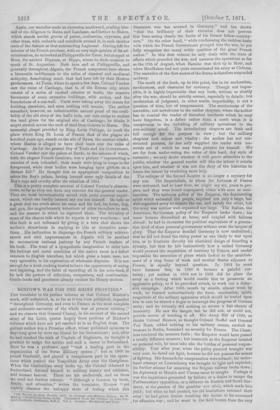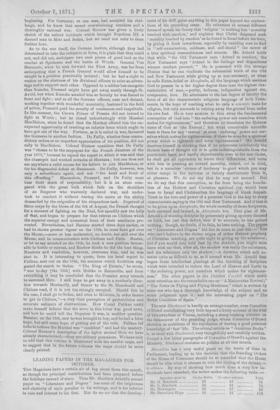RUSTOW'S WAR FOR THE RHINE FRONTIER.* Tun translator in his
preface informs us that Colonel Rtistow's work, still unfinished, is, so far as it has been published, regarded 41 throughout Germany, and even in France, as the most complete and authentic narrative of the whole war at present existing ;" and we observe that General Chanzy, in his account of the second army of the Loire, quotes largely from portions of Riistow's volumes which have not yet reached us in an English dress. The gallant author was a Prussian officer, whose published opinions in days long gone by were too liberal for his Government ; and, after be had reached the rank of Captain of Engineers, he thought it prudent to resign the service and seek a career in Switzerland. Here he was a professor, and "took a leading pert in the organization of the Swiss Military system ;" but in 1860 he joined Garibaldi, and played a conspicuous part in the opera- tions which pushed the Neapolitan Army over the Garigliano. When the Garibaldian army broke up, the Colonel returned to -Switzerland, devoted himself to military history and criticism, and became famous. These are his credentials, and on them we need not further enlarge. "Although a German by birth, family, and education," writes the translator, Riistow "yet lightly discerns the unhappy state of feeling which this The War for Om Rhine Frontier, 1870; it, Political and Military History. By W. 11118ton, °Mono] tho Swiss Army. Tromolatod. from tin Gormum by Jo. ha Loy- lona Noottham, Lioutormat,11.D1.A. Vol. 1. Lotubm : 131ttoltwomt .tdouo. disastrous war has aroused in Germany," aud has shown 44 that the brilliancy of their victories does not prevent him from seeing clearly the faults of his former fellow-country- men." On the other hand, " while condemning the reckless haste with which the French Government pluuged into the war, he yet fully recognizes the many noble qualities of the great French. nation." In this first volume he only deals with the state of affairs which preceded the war, and narrates the operations as far as the 10th of August, when Bazaine was shut up in Metz, and when MacMabon had not quite concentrated his army at Chilton& The narrative of the first scenes of the drama is therefore suspended midway.
The merit of the book, up to this point, lies in its moderation, suecinetness, and character for accuracy. Though not impos- eible, it is highly improbable that any book, written so shortly after the war, should be strictly correct, especially in details; but moderation of judgment, in other words, impartiality, is not a question of time, but of temperament. The succinctness of the narrative, not unwelcome in the earlier chapters, where the author has to remind the reader of historical incidents which he may have forgotten, is a defect rather than, a merit when it is conspicuous in the unfolding of military operations to the non-military mind. The introductory chapters are fresh and full enough for the purpose in view ; but the military chapters lack colour and vitality ; the author has not con- structed pictures, he has only supplied the reader with ma- terials out of which be may form pictures for himself. We are far from under-rating the value of this hard, dry style of narrative ; we only doubt whether it will prove attractive to the public, whether the general reader will like the labour it entails upon him, and whether it was not the duty of the historian to lessen the labour by rendering more help.
The collapse of the Second Empire is no longer a mystery for any one. The Imperialists, to whom the fortunes of France were entrusted, had at least four, we might say six, years to pre- pare, and they were found unprepared, either with men or com- manders. The tortuous policy of the Emperor, the domineering spirit which animated the people, required not only a large, but well-organized army to sustain the one and satisfy the other, but the army was neither well-organized nor large. The Italian, the American, the German policy of the Emperor broke down ; his name became discredited at home, and coupled with failures abroad ; lie had to encounter the political aspirations of a genera- tion tired of sham personal government without even the lacquer of glory. That the Emperor dreaded Germany is now undoubted ; that he did not dread the rising power as one likely to war upon him, or to frustrate directly his cherished design of founding a dynasty, but that he felt instinctively how a united Germany would prevent the acquisition of territory by France, and render Impossible the execution of plans which looked to the establish- ment of a ring fence of weak and neutral States adjacent to France, is equally beyond question. In 1864 he must have foreseen this, hi 1866 it became a painful cer- tainty; yet neither in 1864 nor in 1866 did he place the army on a footing which would enable him to prosecute all aggressive policy, or if he provoked attack, to work out a defen- sive campaign. After 1866, month by month, almost week by week, he learned authoritatively the form, mechanism, spirit, magnitude of the military apparatus which would be hurled upon him in case he stirred a finger to interrupt the progress of German unity ; and he virtually did nothing to secure a fair chance of immunity. He saw the danger, but he did not, or could not, provide means of warding it off. His Army Bill of 1868, so thinks Colonel Riistow, so thought Colonel Stoffel and General Von Roon, added nothing to his military means, excited no tremors in Berlin, furnished no security for France. The Cham- bers rendered the measure futile ; the Emperor would have passed a totally different measure ; but inasmuch as the Emperor insisted on personal rule, he must take also tha burden of personal respon- sibility. Year after year, when the policy pursued brought war very near, he dared not fight, because he did not possess the means of fighting. His demands for compensation were refused ; hie under- hand attempt on Luxembourg was brought to light and exploded; his further scheme for annexing the Belgian railway broke down ; his diplomacy at Munich and Vienna came to naught. Perhaps it was the impatience generated by failure, or a desire to escape the Parliamentary opposition, or a reliance on Austria and South Ger- many, or the passion of the gambler aux abois, which made him yield ; but when he had yielded, his old hesitations resumed their sway ; he had grave doubts touching the means at his command for offensive war ; and he went to the field beaten from the very
beginning. For Germany, as one man, had accepted his chal- lenge, and he knew that meant overwhelming numbers and a thoroughly national war. Colonel Riistow has given a lively ketch of the salient incidents which brought Napoleon III. a doomed man to Metz and Sedan, but we need not refer to them further here.
As to the war itself, the German leaders, although they had determined to take the initiative in force, it is plain that they could not, and did not, anticipate two such pieces of good luck as the 'combat at Spicheren and the battle of Weirth. General You Steinmetz, when he sent forward the First Army, was far from anticipating that a French General would allow himself to be taught in a position practically isolated ; but he had a right to reckon on the alertness of his divisional officers to seize an advan- tage and to support each other. Opposed to a soldier less energetic than Kameke, Frossard might have got away neatly through St. Avoid, but when Kanaeke assailed him so fiercely he was forced to front and fight ; and as all the German officers, near and distant, working together with wonderful unanimity, hastened to the field of action, Frossard paid the penalty of remissness and inaptitude. In like manner, the Crown Prince of Prussia did not intend to fight at Worth ; but he closed unhesitatingly with Marshal MacMahon, when he found that the Marshal offered him the un- txpected opportunity of crushing an inferior force which ought to have got out of the way. Fortune, as it is called in war, favoured the Germans in another fashion. De Failly, whether from contra- dictory orders or an imperfect appreciation of his position, did not rally to Maellahon. Colonel Riistow considers that De Failly was "chosen to be the scapegoat for the French disasters of the year 1870," because he signed the report in which it was said that the chaeaepOt had worked miracles at Mentana ; but one does not see anywhere a valid excuse for his failure to join MacMahon, or for his disgraceful defeat at Beaumont. De Evilly, however, was only a subordinate agent, and not "the head and front of thie offending." Macmahon, Frossard, and De Failly must bear their share of responsibility, but it is an atom com- pared with the great bulk which falls on the shoulders of an Emperor who wantonly declared war, and under- took to conduct it without having the nerve or the ability demanded by the exigenoies of his stupendous task. Deprived of three corps by the blows of the 6th of August, the French thought for a moment of fighting on the Nied, but speedily saw the folly of that, and began to prepare for that retreat on Chalona which the superior energy and numerical force of their assailants pre- vented. Nevertheless, had Bazaine started three days earlier, or had he shown greater vigour on the 16th, he must have got over the Meuse,—more or less maltreated, no doubt, but still over the Meuse, and in communication with Chalons and Paris. Beaten, or let us say arrested on the 16th, he took a new position favour- able to battle or retreat, and Riistow thinks he did the best thing. Numbers and resolution, however, overcame him, and he was shut in. It is interesting to quote, from his brief report to Palikao, sent out on the 19th, the sentence which doubtless sug- gested the march to Sedan. "The King of Prussia," he wrote, "was to-day [the 19th] with Moltke in Rezouville, and from everything it may be concluded that the Prussian army intends to surround Metz. I still hope to get away in a northerly direc- tion towards MontmOdy, and thence to the St. Menehould and Chalons road, if it is not too strongly occupied. Should this be the case, I shall go to Sedan, and even to Maierea, in order thence to get to Chalons,"—a very clear perception of probabilities and accurate estimate of obstructions. How Count Palikao could make himself believe that the news in this letter was good news, and how he could tell the Deputies it was, is another question. Bazaine, on the 19th, saw he was brought to bay, and he had a faint hope, but still some hope, of getting out of the toils. Palikao led folks to believe the Marshal was " confident " and had the mastery. Colonel Biiatow's description of the fights around Metz we have already characterized,—they are military penunicau. Wo have only to add that this volume is illustrated with the needful maps, and to suggest that in the future volumes the maps should be more clearly printed.



































 Previous page
Previous page